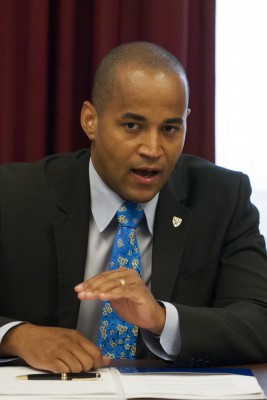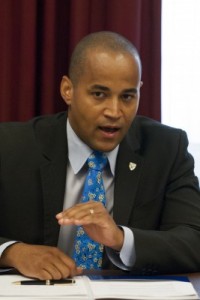
Common-Sense Political Forecasting
The following post by Dante Disparte and Daniel Wagner is cross-published with IRMI in February 2012. Disparte is the CEO of Risk Cooperative and a member of ASP’s Business Council for American Security (BCAS).
Common-Sense Political Forecasting
As global politics continue to gyrate, the pace of change poses ever-greater challenges to accurately predicting the future. Many forecasters have gotten into the habit of declaring—ex post facto—that they got “it” right, when in fact they failed to accurately predict the course of events. Given the multifaceted nature of the world today, predicting the future is quickly becoming a fool’s game and calls for a new paradigm.
Today’s oracles confront a dizzying array of information in an attempt to make sense of the future. Looking for precedents in unprecedented times exposes the shortcomings of managing risk by looking in the rearview mirror. It has gotten to the point where there is so much information out there, it is impossible to consume it all. And yet, most of this information is little more than a regurgitation of news and dated analysis—which is often passé as soon as it is produced. However, average consumers of such information rarely recognize the difference because they don’t have the luxury of spending enough time consuming the information.
It is increasingly becoming the case, given how complex the world has become, that having real insight into the future calls for little more than an appreciation for history, some “street smarts,” and good old-fashioned common sense. This seems to have gotten lost in the blizzard of quantitative indicators and seemingly endless stream of pontifications available in the information markets today. Many of these “wise men” wish us to believe that they possess some kind of magical insight into the future when, in fact, many of them don’t know any more than the rest of us.
The truth is, no person or entity can possibly know everything that needs to be known to accurately predict the future. Even the intelligence agencies often get it badly wrong. The tendrils of the global supply chain are now so interconnected that the Pentagon recently unveiled plans to protect the web of world trade as a top national security priority. So, how can the rest of us hope to get it right?
Part of the answer surely resides in the rise of social media and the “nuggets” of information that are the result of free-flowing thought by ordinary people. A billion imaginations bloom on Facebook, LinkedIn, and Twitter, and perceptions can quickly become reality. With mobile density nearing 90 percent globally, this new paradigm of near perfect interconnectedness is the new form of intelligence that, if properly harnessed, can hold an important key to remaining a step ahead of the competition.
But, equally importantly, we should all be paying even more attention to the lessons of history, which is the best source of information and guide to the future. History teaches us that we will often end up where we started. For example, in Iraq, the mistake of creating artificial country boundaries that tried to forcefully integrate Kurds, Sunnis, and Shia was bound to fail eventually. In Malaysia, granting preferential rights to Malays at the expense of the Chinese was a policy that could not possibly exist without a backlash. And, in South Africa, white majority rule could never last.
The Role of Politics and Economics
What do all these examples have in common? They are joined by human nature and the notion that people will eventually rise up when a situation is grossly unfair. We don’t need an expensive information provider to tell us that. In our view, all we really need to know is the difference between right and wrong and the nature of human nature to have real insight into what direction events will ultimately take a country.
Traditionally, the interconnection between politics and economics is what has driven markets, but today, the impact of development, environmental issues, and sociocultural dynamics must be included in the mix. Taking a static view toward forecasting the direction of markets that does not include this range of variables will likely lead to failure. Each transaction is unique, and each risk profile is specific, so using a broad brush to paint a risk landscape will rarely yield the desired result.
Simple use of intuition and the “smell test” may be more accurate indicators of risk than all the quantitative methods so often used to interpret the world today, which fail to introduce texture and common sense into the equation. Our advice is to study history and listen to your gut. Your chances of being right are as good as, if not better than, an overemphasis on numbers—and a lot less expensive.
 Dante Disparte is the founder and CEO of Risk Cooperative, a strategy, risk and capital management firm focusing on mid-market opportunities, market expansion and equity investments on a global scale.
Dante Disparte is the founder and CEO of Risk Cooperative, a strategy, risk and capital management firm focusing on mid-market opportunities, market expansion and equity investments on a global scale.
Prior to forming Risk Cooperative, Mr. Disparte served as the Managing Director of Clements Worldwide, a leading insurance brokerage with customers in more 170 countries. Mr. Disparte is a specialist in strategy and risk reduction through the design and delivery of comprehensive risk solutions of worldwide scope. He is credited with designing the world’s first card-based life insurance program for the United Nations, a plan that has placed more than a half billion USD of risk with the markets in more than 150 countries. This innovation was heralded as one of the top product innovations of 2011 by the MENA Insurance Review. Mr. Disparte serves as the Chairman of the board of the Harvard Business School Club of Washington, D.C., and on Harvard Business School’s global alumni board. He is a founding member of the Business Council for American Security and an advisory member with the American Security Project.
He was formerly the Managing Director of Land Rover’s operations in 32 Sub Saharan African markets and held numerous general management roles in Denmark, where he developed applied skills in social entrepreneurship. Mr. Disparte is credited with developing a humanitarian fleet management solution that is proven to reduce the economic, environmental and social impact of humanitarian operations. This body of work is profiled in a business case published by INSEAD’s Social Innovation Centre. He served on the board of directors of Kjaer Group A/S, one of the top 10 workplaces in Europe and the top workplace in Denmark for 4 years and currently serves on the board of Communities in Schools Nation’s Capital, where he chairs the fund development committee. He is conversant in 6 languages and has published numerous articles on the subject of risk, strategy and business effectiveness. A graduate of Harvard Business School’s Program for Leadership Development, Mr. Disparte holds a degree in International and Intercultural Studies from Goucher College and a MSc. in risk management from NYU’s Stern School of Business.





